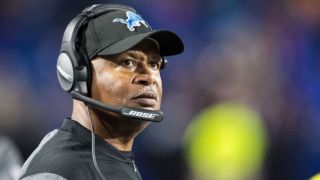|
ALLEN PARK, Mich. -- It's something they have trouble explaining. For more than a year they've talked about it, answering question after question about why the Detroit Lions offense continually starts slow. The question leads to a lot of puzzled expressions on the faces of Lions players. It leads to a lot of "I don't know" answers. Since Jim Caldwell took over as coach in 2014, the Lions have struggled to score early in games under coordinators Jim Bob Cooter and Joe Lombardi. Detroit's loss to the Saints on Sunday was the epitome of those issues. The Lions were down 17-7 after the first quarter and 31-10 at halftime. They gave up scores -- three touchdowns and a field goal -- on four straight possessions. The Lions rallied, but too often the team's comebacks over the past two seasons have been necessitated by rough starts. "Did a good job staying with it, not giving up in the game, but you saw at the end -- the mistakes we made in the beginning were just too much to overcome," running back Ameer Abdullah said about Sunday's game specifically. "Turnovers, miscues, breakdowns in all phases, running, passing, catching, everything. When you put yourself in a hole like that -- I respect and appreciate how we fought -- but as a team and as a unit, we didn't put ourselves in a position to win, and you can't expect to win with those kind of lapses."  The Lions hadn't found themselves facing that large of a deficit in recent games, but the trend is there. When asked why Detroit continually struggles in the first half, the loquacious Abdullah was at a loss for what to say. The Lions hadn't found themselves facing that large of a deficit in recent games, but the trend is there. When asked why Detroit continually struggles in the first half, the loquacious Abdullah was at a loss for what to say.
"Not sure. Not sure," he said. "I'm not sure." The comeback culture worked for Detroit last season. This season, the Lions are 1-3 in games they trail in the fourth quarter. But the poor starts have been an issue for years now. The Lions have been outscored 37-17 in the first quarter and 55-45 in the second quarter this season. They've forced their fewest turnovers in the first quarter -- the only quarter their turnover margin is in the negative. This is despite Detroit holding the ball longer, on average, in first quarters (8 minutes, 58 seconds) than any other quarter. In 2016, the Lions were outscored in first quarters 62-60 -- although the Lions were outscored in every quarter but the second last season. Detroit also had its longest time of possession, on average, in the first quarter, but teams outgained the Lions. This was not an issue in the second half of the 2015 season, when the Lions had a plus-30 point differential after Cooter took over as offensive coordinator. They actually were a fast-starting team (plus-46 in the first half) while fading in the second halves (minus-27). It's more than a Cooter issue. In 2014, Caldwell's first season, Detroit was outscored 73-71 in the first quarter with a minus-2 turnover differential. Caldwell, though, had no answer for the commonality of his team's slow starts. "I don't think so. It's just kind of one of those things. We've had a couple, we certainly would like to not have them, but it's the way it is," Caldwell said. "This particular game we had the one play down there, ended up with a score, we come right back offensively, move the ball down the field, put it in the end zone. "So, that was one series we started out pretty slow. Next series we did pretty well and then we just kind of went dormant." The Lions can't explain it -- other than it keeps happening. The poor starts have led to multiple Matthew Stafford comebacks, but it's an issue the Lions need to address to be a contender in the long term. Doing so would allow the Lions to have a better run/pass mix and open up more of Cooter's playbook. The issue isn't necessarily Stafford, either. He has thrown his fewest passes (53) in the first quarter and has a 65.2 completion percentage -- second best by quarters. His 301 yards in the first quarters of games are the fewest thrown in a quarter by Stafford this season, and his passer rating (89.1) and QBR (54.0) are the second-highest of any quarter he's played in this season. Players said it wasn't scheme, either. Detroit has had the fewest offensive snaps (84) in the first quarter. But the run/pass balance (46 passing attempts, 33 rushing attempts) is the most balanced of any quarter for the Lions. So in theory, Detroit could be more unpredictable in the first quarter than any other quarter. Yet the Lions are averaging 2.24 yards per play on first downs in the first quarter, creating tougher second downs, when they average 5.2 yards per play. Detroit is doing well on third downs, averaging 8.54 yards per play. The Lions have scored both their first-quarter touchdowns this season on third down. So trying to figure out why Detroit has struggled early in games is really tough. The players don't know -- or won't say. Neither will the coaches. But they believe if they fix it, they could have a really strong team. "I don't know if there's a reason. I don't know how to explain it," receiver TJ Jones said. "I think it's, once we find the answer, we're going to be unstoppable. In this league, you can't take that long to start up and hope to come back, you know, at the end of every game. "So once we figure out what the reasoning is for our slow starts and whatever it may be, I think we're going to be a team to reckon with."
|
